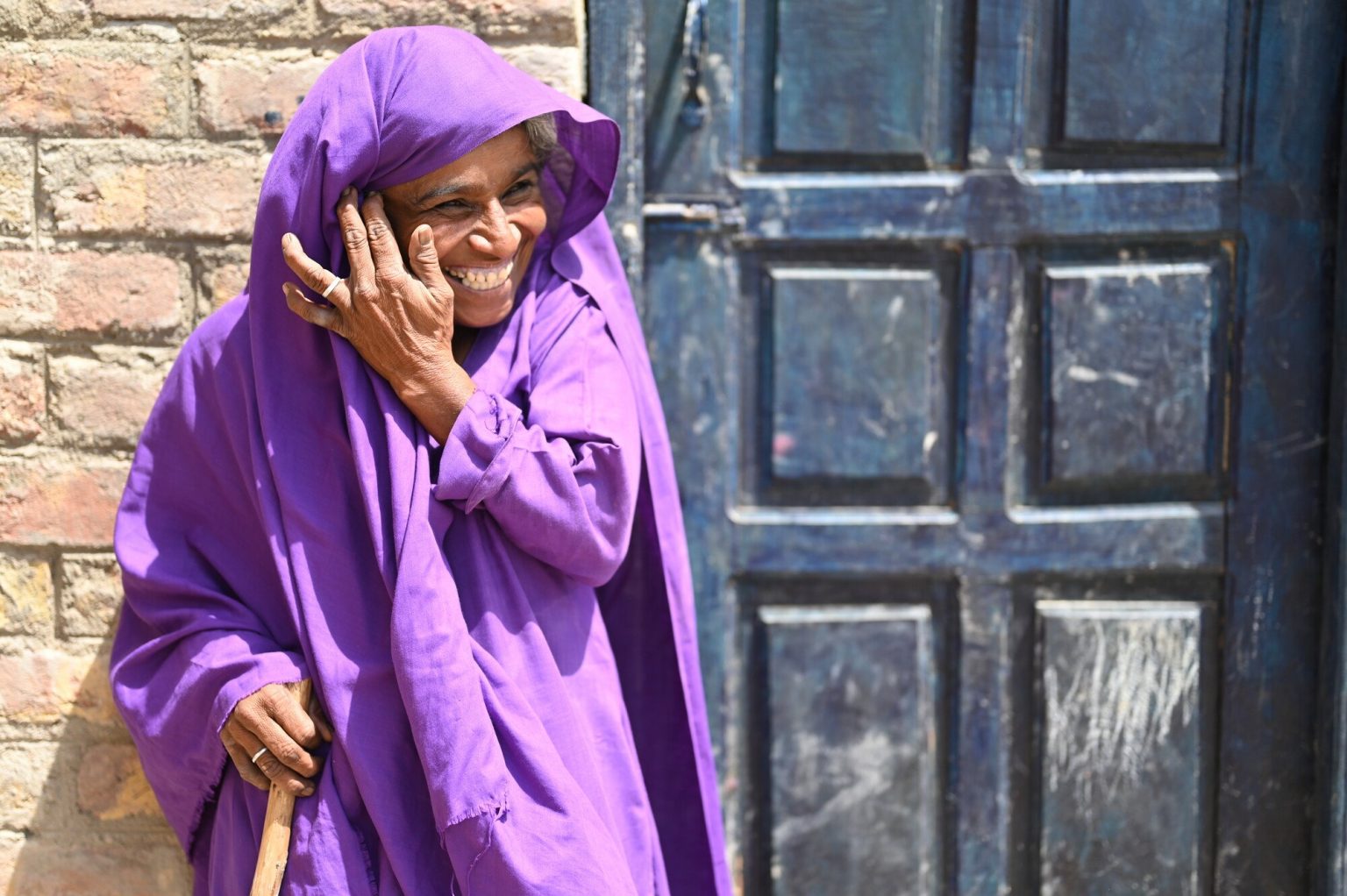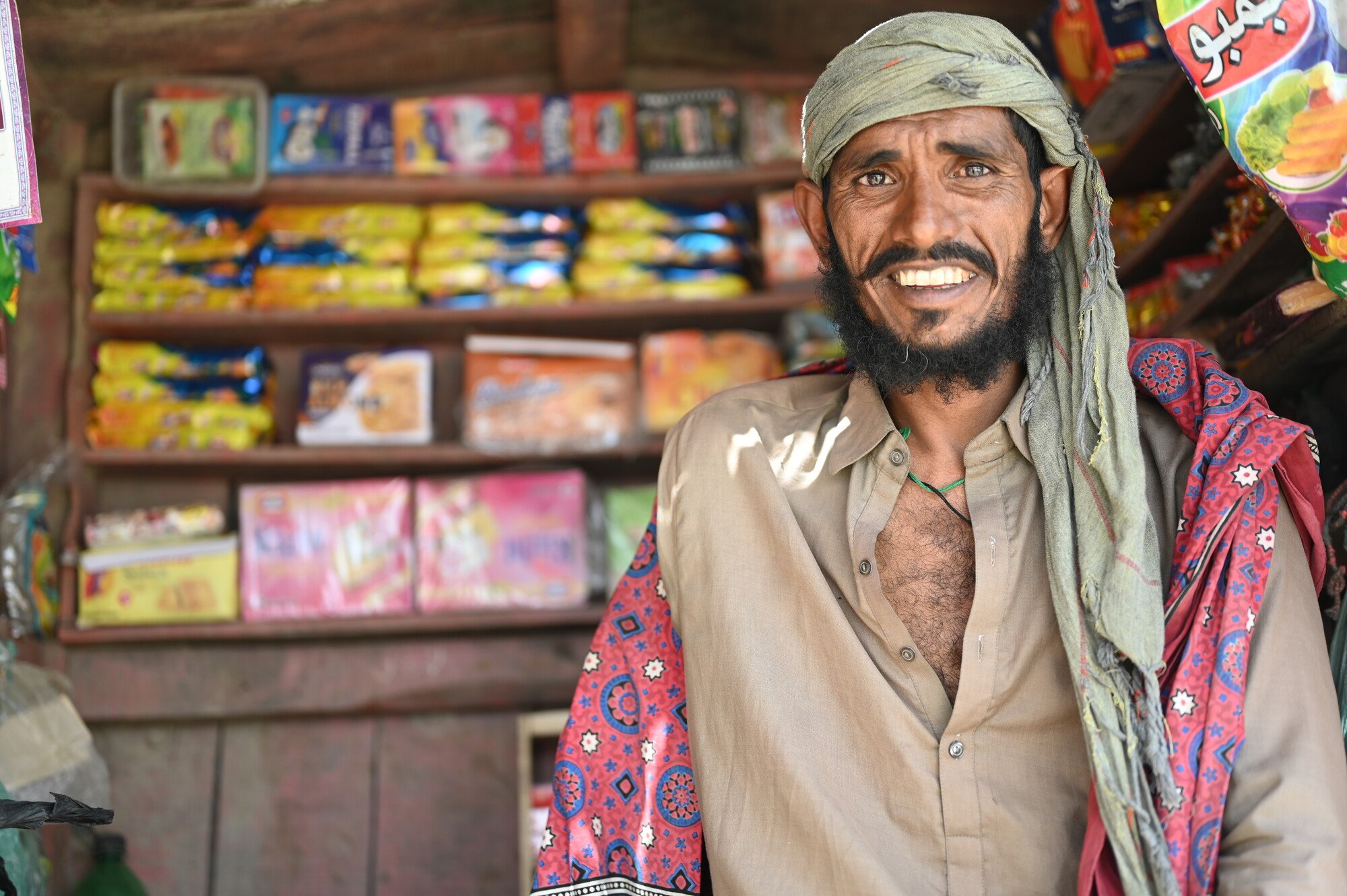“It seems like a miracle”
One year after historic floods affected huge areas of Pakistan, Oxfam and partners continue to give people hope.
When heavy monsoon rains and flooding rivers submerged her home in the province of Baluchistan in 2022, Imam Zadi said she was left with few options to keep her family safe.
“In the beginning, it was windy… Then came the flood. The wind was so strong that our rooftops were blown away, and all our thatched huts fell down. Everything was gone, nothing was left for us. We got scared when water came in along with rains.”
“’Oh God, where to go,’ we said, where to go with children in these circumstances? There was no safe space, to even run away,” she said.
Desperate, she took her children to a nearby road on higher ground. Within days, aid groups including Oxfam and our local partner organizations, arrived to help people living in the open.
Oxfam provided Zadi and her family water containers and clean water. “This has benefitted us a lot,” Zadi said. “Our water is clean… Now, the water is safe here. And we are using water with care.”
Massive monsoon flooding affected tens of millions of people
Zadi was one of the more than 9 million people affected by unusually heavy monsoon rains that hit her home province in 2022. The rains started in June, and by August had inundated large areas of Baluchistan and Sindh Provinces. The government of Pakistan described the incessant monsoon rains as a “climate-induced humanitarian crisis of epic proportions,” and declared a national emergency on August 25th.
- 33 million people were affected overall, roughly 15 percent of the population of Pakistan. By the end of November, the government reported that 1,100 people had died and 8 million people were displaced.
- Rainfall nationwide was 2.87 times higher than the national 30-year average. Baluchistan and Sindh provinces received more than five times as much rainfall as their 30-year averages.
- More than 2 million houses were damaged or destroyed.
- 1.16 million livestock died, and 3.6 million acres of crops and orchards were destroyed.
- 13,115 kilometers (7,869 miles) of roads and 439 bridges were damaged, and 17,566 schools were damaged or destroyed.
“It remains deeply unjust that Pakistan, which is responsible for less than one percent of global greenhouse gas emissions, is one of the countries most vulnerable to severe weather due to the effects of climate change," said Oxfam Country Director Syed Shahnawaz Ali, shortly after the government’s emergency declaration.
What Oxfam is doing to help people in Pakistan
As flood waters advanced in Pakistan, Oxfam mounted a partner-led response to help people displaced by the disaster, working closely with the Tameer e Khalq Foundation (TKF) and the Society for Human Advancement and Disadvantaged Empowerment (SHADE) in Baluchistan. In Sindh we are collaborating with the Strengthening Participatory Organization (SPO), the Laar Humanitarian Development Programme (LHDP), and the Advocacy, Research, Training and Services (ARTS) Foundation.
The main areas of work have included providing clean water, installing and repairing latrines and other sanitation systems, and distributing hygiene items like soap to help people keep clean and avoid water-borne diseases. Oxfam and our partners also took steps to help protect the most vulnerable women and children displaced by the flood waters as well as provided cash to affected people to help them buy food and meet other crucial needs. By July 2023, Oxfam and our partners have assisted 375,377 households with:
- $648,232 in cash
- 24,400 shelter kits
- 18,000 jerry cans to store clean water
- 19,000 hygiene kits with soap, tooth brushes, laundry soap
- 19,000 dignity kits for women, including menstrual products, and underwear
- 26,000 mosquito nets
- 7,000 kitchen sets
- 10 safe spaces to help women and girls access psychosocial services
- 720 water filtration units
- 16,371 winterization kits with blankets, tarps, and warm clothing

Kizban, 50, says her village did not have proper toilets before the 2022 floods inundated the area. Since a new latrine was installed near her home, she says she worries less about her daughter when she needs to use the facilities at night. Tooba Niazi/Oxfam
Latrines and cash grants helping communities recover
Helping communities to improve sanitation systems was a priority in areas recovering from the flooding, to prevent disease like cholera from spreading. In Mirpurkhas, in Sindh province, 50-year-old Kizban says the village is grateful for the toilets installed by Oxfam’s local partner Strengthening Participatory Organization after the flooding.
“We never had a toilet here,” she says. “Imagine going out in the dark with dogs howling around! It was both scary and unsafe. After sundown I would not let my daughter go out."
“Oxfam and its partner SPO have built us these latrines which are not only accessible but safe,” she says, noting that the new latrine installed near her home has calmed her fears for her daughter.
“At least I do not have to worry about my daughter, and perhaps many other mothers of the village think the same.”

Ghulam Mustafa used cash provided to him by the Strengthening Participatory Organization to open a shop. The shop is doing well and he expects to cover the education costs of his children and expand his retail operation in the future. Tooba Niazi/Oxfam
In another area of Sindh province, Oxfam’s partner provided a cash grant to Ghulam Mustafa, and he used some of the money to open a small roadside store. Mustafa, 38, says the cash created a way for him to make a decent living even though he is living with a physical disability.
“I lost one of my arms in an accident,” he says, standing in front of his store. “It is difficult for a person with any disability to work. Our village life became very difficult when the floods hit. I didn’t have money to send my children to school. When I received the cash, the moment I got it I knew I had to have a sustained source of earning.”
Mustafa says the future looks positive for him and his family now. "If the shop continues this way, I will be able to send my children to school,” he says. “If the profit keeps running, then I will start another shop as well.
“The floods have been devastating for our villages, and it seemed that the communities affected wouldn’t be able to recover. But we are moving back to life. It rather seems like a miracle.”

